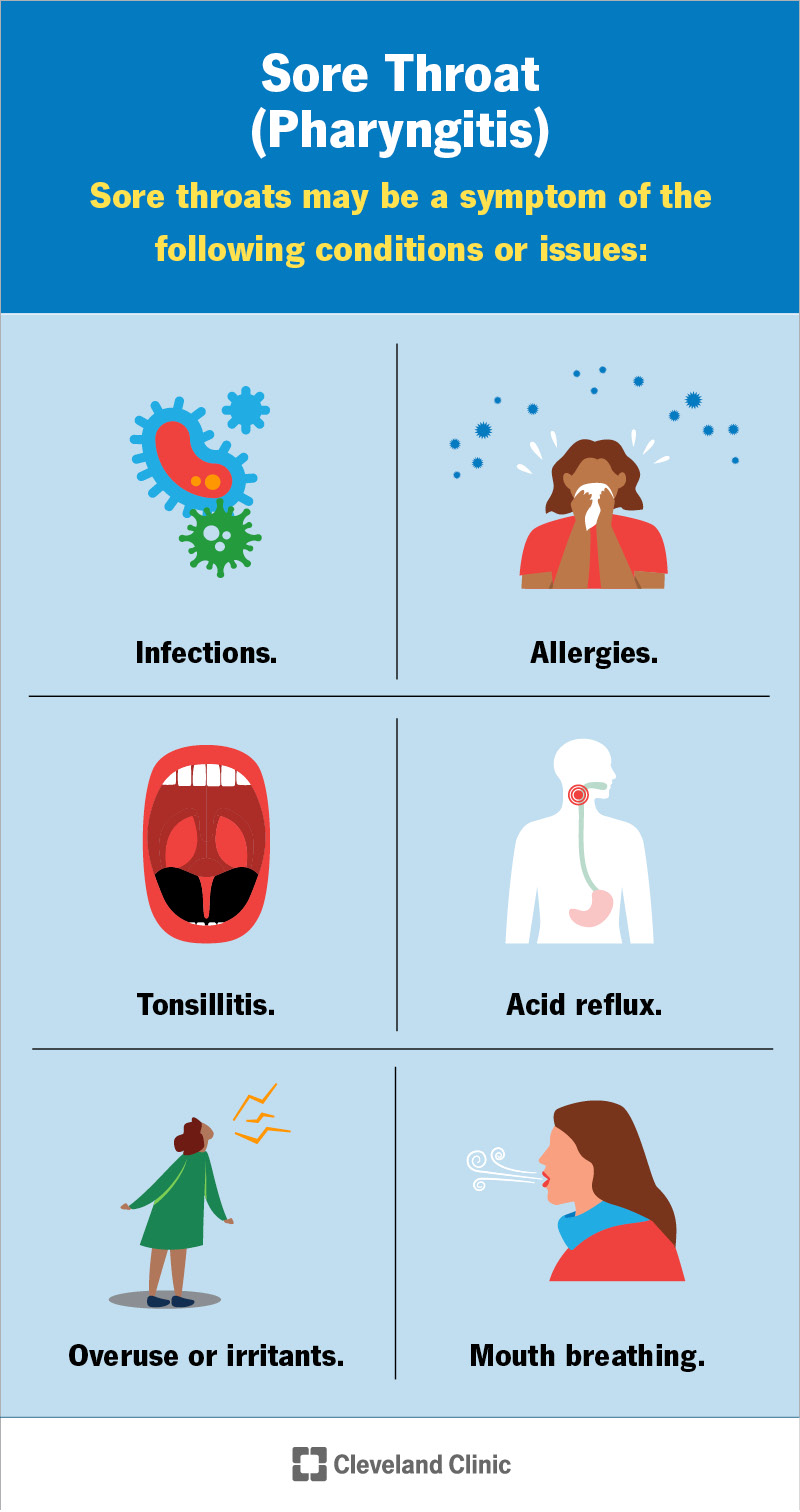A sore throat is a scratchy or burning feeling in the back of your throat. It may hurt to swallow or talk. Most sore throats happen because of a viral infection, like the common cold or flu. Sore throat symptoms typically go away in a few days.
A sore throat is a scratchy painful feeling in the back of your throat. If you have a sore throat, it may hurt to swallow or to talk. Many things cause sore throats, from bacterial and viral infections to allergies and sleeping with your mouth open. Most sore throat symptoms go away in a few days. You should contact a healthcare provider if your sore throat lasts longer than a week, gets worse or you develop symptoms like fever or swollen lymph nodes.
A sore throat may start with a raspy feeling in your throat, as if your throat is dry. It may also feel like your throat is on fire. If your sore throat gets worse, you may feel a sharp pain in your throat when you swallow or talk. You may feel pain in your ears or down the side of your neck.
It can be. For example, a sore throat that lasts more than two weeks may be a symptom of throat cancer. A sore throat is one symptom of COVID-19. Most of the time, however, a sore throat is a symptom of less serious conditions.
Advertisement
Cleveland Clinic is a non-profit academic medical center. Advertising on our site helps support our mission. We do not endorse non-Cleveland Clinic products or services. Policy

Apart from throat pain, sore throat symptoms may include:
Most sore throats happen because you have a viral infection, like the common cold or flu. Sore throats may be a symptom of the following conditions or issues:
Advertisement
Healthcare providers diagnose sore throats by examining your throat, tongue and possibly your ears. They may do a strep test to rule out strep throat.
Treatment depends on what caused your sore throat. For example, if your throat is sore because you have a cold, a healthcare provider may recommend over-the-counter medication to ease your cold symptoms and for your sore throat. If you have strep throat, a healthcare provider may prescribe antibiotics to treat the bacterial infection. Other treatments for specific causes may include:
Sucking on throat lozenges or hard candies may ease sore throat symptoms. Other suggestions include:
First, find out why you have a sore throat. If a healthcare provider finds a cold or flu is the culprit, ask for recommendations for getting better as quickly as possible.
Advertisement
Viral infections like colds and flu often cause sore throats. You can reduce your sore throat by protecting yourself against colds and flu. Some ways to do that include:
Most of the time, a sore throat isn’t a serious medical issue. Most sore throats go away within a few days. You should contact a healthcare provider if your sore throat lasts longer than a few days or if you have a sore throat and the following issues:
Most sore throats happen because you have a viral or bacterial infection. Taking care of the infection will help your sore throat. You can ease sore throat symptoms by:
A note from Cleveland Clinic
Maybe your sore throat started with a tickle in the back of your throat. Now that tickle is a pain — literally — and it hurts a lot when you swallow or talk. Most sore throats happen because you have a viral infection that will run its course in a week or so. But you may need antibiotics if your sore throat stems from a bacterial infection. Fortunately, there are many home remedies to ease sore throat pain. There are instances, however, when a sore throat may be a symptom of serious medical issue. If you have a sore throat that lasts for more than two weeks, talk to a healthcare provider.
Last reviewed on 11/08/2022.
Learn more about the Health Library and our editorial process.
Advertisement
Cleveland Clinic is a non-profit academic medical center. Advertising on our site helps support our mission. We do not endorse non-Cleveland Clinic products or services. Policy